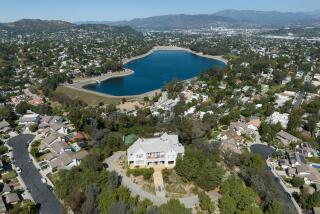Cherokee Group Takeover Offer Triggers Battle Among Leaders
- Share via
Civil war has broken out in Cherokee Group’s executive suite.
Three top Cherokee executives, including President Robert Margolis, joined an investor group that launched a $174-million takeover bid for the fast-growing Sunland apparel and shoe concern this month.
But conspicuously absent from the group was Cherokee Chairman James P. Argyropoulos, who started the company in 1973. Argyropoulos previously said he opposed selling Cherokee, but the Margolis group proceeded with its offer.
So, last week, Argyropoulos filed suit in federal court in Los Angeles against the other executives, his own company and others in hopes of blocking the acquisition attempt by the investor group, Green Acquisition Co. The group is offering $14 a share in cash and securities.
Argyropoulos’ suit claims that there has been open hostility among Cherokee’s top managers for the last several months.
The suit also claims that the takeover proposal not only attempts to coerce shareholders into accepting an unfairly low price, but also would result in radical changes in Cherokee’s business strategy that would erode its profit margin.
Self-Interest Claims
He also accused Margolis and the other two Cherokee executives involved in the offer--Cary D. Cooper, executive vice president, and Jay L. Kester, marketing president of Cherokee’s apparel business--of pursuing the bid largely to enrich themselves at the expense of Cherokee’s other stockholders. The trio together own slightly more than 2% of Cherokee’s stock.
Argyropoulos also said that shortly before Green began its offer, he made a last-minute offer to buy all of Cherokee’s stock for $14 a share cash. But he said Cherokee’s seven-member board--which included Margolis, Cooper and Kester--declined to consider his proposal because it “was only marginally better” than the Green bid, “which was a firm offer and before the board.”
The board then voted 5 to 2 to accept the Green offer, but to solicit other bids as well. The two dissenters were Argyropoulos and his twin brother, Arthur Argyris.
Margolis and Argyropoulos could not be reached for comment. Arnold Chase, a lawyer representing Margolis, Cooper and Kester, declined comment on the suit.
Marc W. Rappel, a lawyer representing Deutschman & Co., the Los Angeles investment firm that organized Green and is also a defendant, termed the suit “another attempt by Mr. Argyropoulos to deprive stockholders of an opportunity to sell their stock at a substantial premium.”
“We believe the lawsuit has no merit and will vigorously defend it,” Rappel said.
Apparent Falling Out
At the heart of the suit is an apparent falling out between Argyropoulos and Margolis. Cherokee got its start after Argyropoulos began to make shoes for customers out of his shoe shop in Mar Vista. Cherokee grew steadily. Then in 1981, he expanded into clothes, and brought in Margolis, a veteran apparel executive. Cherokee has grown rapidly since then, its sales jumping from $34 million in 1980 to $139.6 million in its fiscal year ended last Nov. 28.
Now Cherokee is primarily a clothing company, notably jeans and women’s casual apparel, with clothing accounting for 81% of Cherokee’s sales last year. Margolis has been well rewarded for his work, earning $1 million last year in salary and bonus.
However, Argyropoulos said in his suit that if Green acquires Cherokee, Margolis would “dangerously expand” Cherokee’s sales to discount retailers to boost sales. Such a move “will result in progressively lower profit margins,” and so-called premium retailers, seeing Cherokee’s increased sales to discounters, “will eventually cease doing business with us,” Argyropoulos predicted.
In its fiscal 1987, Cherokee’s profit surged 53% to $10.4 million, for a profit margin of 7 1/2 cents per dollar of sales.
In his suit, Argyropoulos said his refusal to support Green’s takeover attempts prompted Margolis to resign in June or July. Yet after the board accepted Green’s $14-a-share offer, Margolis asked Argyropoulos to make a motion before the directors that he be reinstated. “I declined,” Argyropoulos said.
But the board told him that the takeover agreement they accepted obligated Cherokee to reinstate Margolis, Argyropoulos said. So Argyropoulos told the board that Margolis “would report directly to me,” the suit said.
Green already has started a cash tender offer of $14 a share to acquire up to 49.9% of Cherokee’s 12.4 million common shares outstanding. Each remaining share would be exchanged for about $12 cash and bonds priced at $2.
In public trading, the company’s stock, which went public in December 1983 at $9 a share, has since climbed to the equivalent of $52 (unadjusted for two 2-for-1 splits). But a year ago, before the Oct. 19, 1987, stock market crash, Cherokee was trading for the equivalent of nearly $100 a share.
Closed at $12.875
Adjusted for the splits, the stock dived to about $6 a share after the crash, and closed Monday at $12.875 a share in over-the-counter trading.
Green initially offered $12.50 a share, then sweetened it to $13 a share in July. Argyropoulos, Cherokee’s biggest stockholder with a 14.5% stake, publicly backed the second offer, but only for a few days.
In his lawsuit, he said he briefly supported the deal only because Margolis had threatened to quit if the deal didn’t go through, and “I was faced with the disintegration of my management team.”
A hearing on the suit is scheduled for Oct. 7. Meanwhile, all four executives are still employed at Cherokee, Chase said. But he declined to elaborate on their working relationship.
More to Read
Sign up for Essential California
The most important California stories and recommendations in your inbox every morning.
You may occasionally receive promotional content from the Los Angeles Times.










